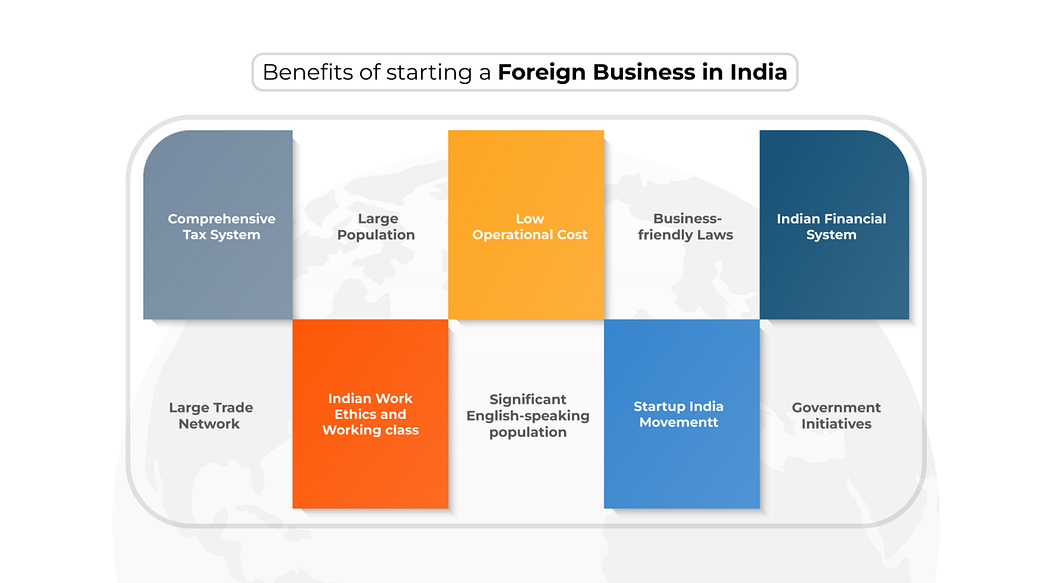Introduction
There are numerous methods to benefit from starting a business in India. One of the best nations for global company growth is India. Plans for a foreign company’s expansion in India must be supported by detailed market analysis and a sound business strategy. Before beginning any form of business, it is important to be aware of the benefits of your enterprise, including the market, workplace, and location. It’s critical to comprehend the ideal business development approach. The comprehensive information in this article will assist you in learning more about the suggestions for growing foreign business in India.
With the help of our in-depth guide on foreign company registration in India, you can unleash the potential for international business growth. Investigate the advantages of entering the booming Indian market, supported by careful market study and a solid business plan. Learn about the essential elements for effective business development, such as market insights, workplace concerns, and strategic location selections. Arm yourself with the knowledge you need to make wise choices and advance your international business in India’s thriving marketplace.
What are the advantages of establishing a foreign company in India?

1. Comprehensive Tax System: The network of tax treaties in India is extensive. The Direct Taxes Code and the Goods and Service Tax (GST) have also recently changed the Indian tax structure to make doing business simpler.
2. large population: One of the main benefits of beginning a business in India is that it has a vast population, a sizable market without boundaries, and well-established logistics. For many years to come, global businesses are likely to be drawn to India because of its young population and expanding economy.
3. Low Operational Cost: Everything needed to start a firm, including infrastructure, phones, the internet, labor, and salaries, may be operated at a noticeably low cost. Additionally, individuals are willing to work for little pay.
4. Business-friendly Laws: In recent years, the Indian Parliament has approved many significant measures that are advantageous for the majority of industrial sectors. The efficiency of moving goods around India has grown because of, the Goods and Services Tax Bill. There are new tax laws in the Direct Taxes Code Bill.
5. Indian Financial System: India has a well-regulated financial system with access to developed markets worldwide and the ability to be financed from a variety of sources subject to certain RBI rules and regulations, etc.
6. Large Trade Network: Backed by regional and bilateral free trade agreements, India has a sizable network of technical and management institutions that meet the highest international standards. There are also a lot of additional trading partners out there.
7. Indian Work Ethics and the Working Class: Indians are renowned worldwide for having strong work ethics. Indians are distinct from South Asians in that they mix a strong work ethic with an openness to learning and a “never say no” mentality. In addition, the large proportion of Indians who are working age (18 to 65) extends the period of time during which services are available in the Indian market. The young people are now seeking possibilities after coming out of the closet. Businesses can take advantage of this chance by creating jobs and raising production.
8. Significant English-speaking population: For business purposes, India boasts a sizable English-speaking population. Due to their extensive ties to the UK, Indians are fluent in English. Even though Indian English has a somewhat different accent and vocabulary from British or American English, international organizations will substantially benefit from graduates’ fluency in English and their knowledge of the several regional Indian languages.
9. Startup India Movement: As part of the “Startup India Movement,” the government is enacting a number of changes to open doors for attracting foreign direct investment (FDI) and promoting corporate alliances. To reduce the burden of outmoded policies and regulations on the business environment, certain efforts have already been made. In order to raise India’s standing on the World Bank’s “Ease of Doing Business” index, this reform is also in line with its criteria.
10. Government programs: The Indian government has launched numerous programs to draw foreign capital into the country’s numerous industries. To entice investors, it periodically announces many alluring policies and plans. The specific ministries of each business have worked hard to relax the laws and standards governing foreign investment in that area.
What are the top 3 strategies for expanding foreign business in India?
There are several suggestions for growing a foreign company in India, but the key three are as follows:
Appoint a country manager: A country manager is in charge of the company’s expansion into a new country or territory. He or she is responsible for directing the market’s introduction, growth, and offerings from manufacturing to commercialization via the market’s distribution channels. According to their knowledge of the market, the area, and the language, they are ideally suited to design the proper plan and assure the successful foundation of the company on the ground through constant study of the competition. For foreigners, India frequently offers significant cultural contrasts in terms of social, personal, or professional life. You will find it simpler to implement your management style and have greater professional success if you hire a country manager.
Select the proper region: India is a difficult country. It would be incorrect to assume that every region is the same. India has 29 states with various characteristics and 23 official languages, with the north and the south clearly dividing culture and language. Because of this, it’s crucial to concentrate on the Indian region you’ve chosen before attempting to launch a firm.
You can establish yourself with the help of your industry. For instance, Hyderabad is good for the sciences, Bombay is ideal for consulting, and New Delhi is ideal for sensitive businesses. Bangalore is finest for the IT sector. Pune is a heavily industrialized city, Chennai is a hub for many enterprises in the IT and automotive industries, and Tirupur is a center for the textile industry. There are other disadvantages to consider, so make sure you continually search for offices in key locations and hire personnel with the necessary credentials.
A skilled workforce: India has the benefit of a talented workforce that is both affordable and highly qualified. It ranks among the top 10 economic superpowers in the world and has a populace that is increasingly younger and more active. India is still evolving and becoming a more appealing prospect because of its growing middle class. But doing business in India is still a complicated undertaking. Wait until your project has been thoroughly investigated before starting. Not all businesses are fit for this Asian nation.
Conclusion
India’s economy is among the fastest-growing in the world, and it has a sizable market of more than 1.2 billion people. Since India is known for its diversity, it is essential to seek out expert advice and do research in order to comprehend the market’s structure, consumer preferences, and execution. Foreign Direct Investment (FDI) has attracted a sizable amount to India due to its opportunities, and as more foreign companies are registered each year, FDI inflow grows.


No comments yet